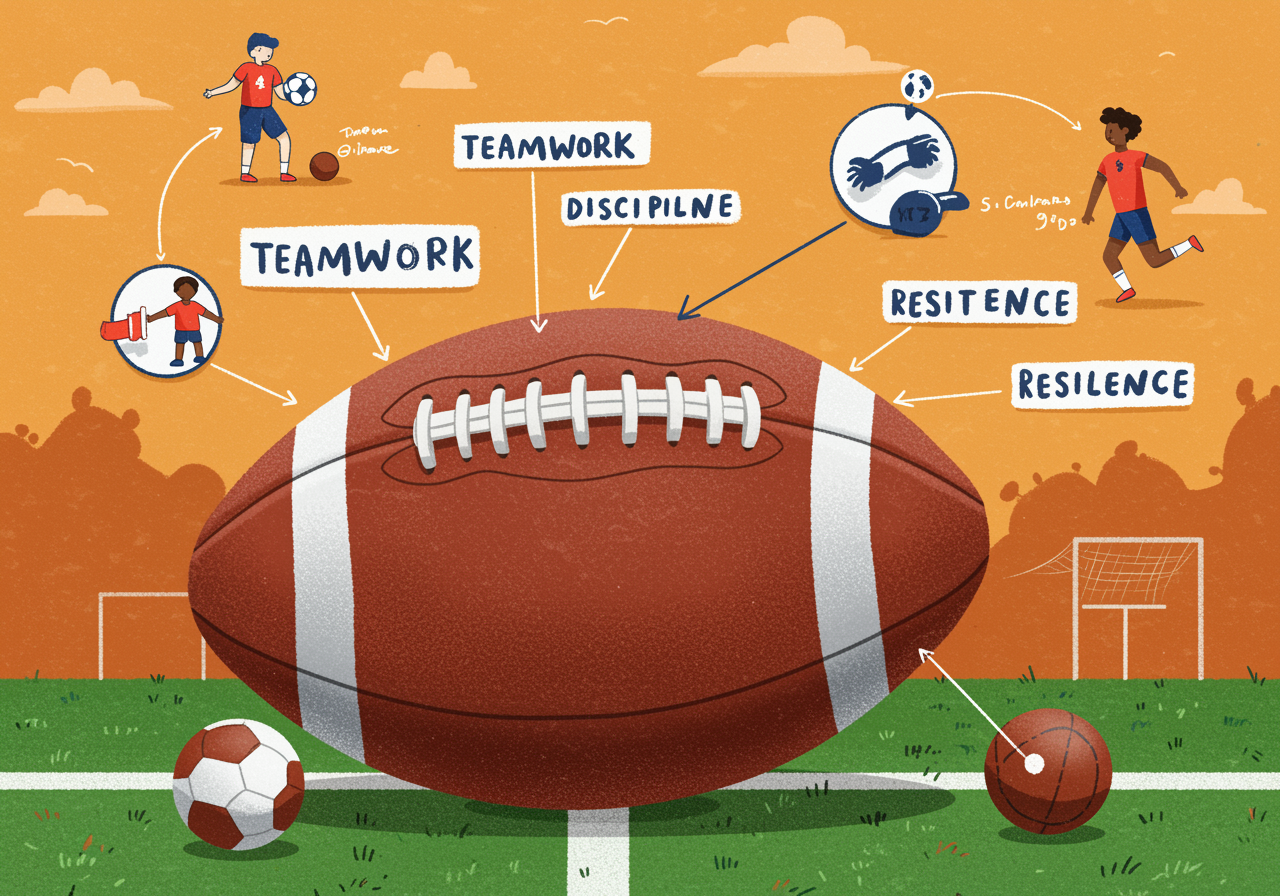From Gridiron to Great Life: How Football Camp Creates Everyday Champions
The surprising ways football training transforms players into life superstars
Discover how the intense skills learned at football training camps become secret weapons for success in school, friendships, and future careers.
Overview
Think football training camp is just about tackles and touchdowns? Think again! Those grueling summer weeks create a secret training ground for life skills that help players succeed long after they hang up their cleats. From learning to work with teammates who think differently to bouncing back from epic fails, football camp teaches lessons that show up everywhere – in group projects, job interviews, and even family dinners. The best part? These skills are so powerful, they work whether you're calling plays on the field or navigating the game of life.

Understand in 30 Seconds
Get up to speed quickly
- Teamwork Makes the Dream Work: Football players learn to work with 10 other people who all have different jobs but share the same goal. This translates perfectly to group projects, family chores, and future workplace teams.
- Discipline = Freedom: Camp teaches players that showing up, practicing hard, and following the plan actually gives them more freedom to succeed. The same discipline helps with homework, chores, and reaching personal goals.
- Pressure Makes Diamonds: Learning to think clearly when the clock is ticking and everyone's watching builds confidence for presentations, tests, and big life decisions.
- Failure Is Just Feedback: Every dropped pass or missed tackle becomes a learning opportunity. This mindset helps players handle mistakes in school, relationships, and work without giving up.
Real Life Scenario
Situations you can relate to
Imagine your teen comes home from football camp talking about how they learned to 'read the defense.' But here's the cool part – that same skill helps them 'read the room' at school! When they're working on a group project and notice one teammate seems frustrated, they know how to adjust their approach, just like changing a play when they see the other team's strategy. The communication skills they practice in huddles? Those become the foundation for speaking up in class discussions or having tough conversations with friends. And that mental toughness from running drills in 90-degree heat? It shows up when they're struggling with a challenging math problem but refuse to give up.

Role Play
Spark a conversation with “what if” scenarios
What if you had to convince your family to try a new vacation destination?
- Role play: Practice the leadership and persuasion skills learned in football by having your teen present their case like a team captain rallying players before a big game.
What if you were working on a group project and one person wasn't doing their part?
- Role play: Role-play how to handle team conflicts using the same communication strategies coaches teach for dealing with teammate disagreements.
What if you failed a big test or made a mistake at work?
- Role play: Practice the 'film study' approach from football – analyze what went wrong, learn from it, and create a game plan for improvement without dwelling on the mistake.
FAQs
Frequently asked questions people want to know
Do these skills really transfer if my kid stops playing football?
Absolutely! The mental and social skills are like muscle memory – once learned, they stick around. Many former players become successful leaders in business, education, and other fields using these exact skills.
What if my child isn't naturally athletic?
Football camp isn't just about athletic ability – it's about mental toughness, teamwork, and character. Many of the most valuable lessons come from effort and attitude, not natural talent.
How can parents reinforce these lessons at home?
Connect camp experiences to daily life! When your teen shows persistence with homework, point out how it's like pushing through a tough practice. Celebrate their teamwork during family projects using football language they understand.
Examples in the Wild
See how this works day to day
- NFL player J.J. Watt credited his football discipline for helping him succeed in business ventures and community leadership after retiring from professional sports. (ESPN Business Profile 2023)
- A study of Fortune 500 CEOs found that 95% played organized sports in high school or college, with many citing teamwork and resilience as key leadership skills. (Harvard Business Review 2023)
- Military leaders often recruit former football players because the sport teaches quick decision-making under pressure and the ability to execute complex strategies as a team. (Military Times Leadership Study 2023)
- Teachers report that students who participate in football training show improved collaboration skills in group projects and better ability to handle academic setbacks. (Journal of Educational Psychology 2023)
In Summary
What you should know before you start
- Football training camp builds teamwork skills that help in school projects, work teams, and family cooperation
- The discipline learned through rigorous practice schedules transfers to better study habits and personal goal achievement
- Learning to perform under pressure on the field builds confidence for presentations, interviews, and big life moments
- The resilience developed from handling losses and mistakes creates a growth mindset that serves players throughout life
Pro-tip for Parents
You got this!
When your teen talks about football camp, resist the urge to immediately ask about their performance or stats. Instead, ask questions like 'What was the hardest part of working with your teammates today?' or 'Tell me about a time you had to bounce back from a mistake.' This helps them recognize and articulate the life skills they're developing, making the connection between sports and real-world success more obvious.

Keep an Eye Out For
Find these examples in everyday life
- Watch for moments when your teen demonstrates teamwork at home, then connect it back to their football training
- Notice how they handle setbacks or frustrations – football training often shows up as improved resilience
- Look for leadership opportunities where they can apply communication skills learned in team huddles and strategy sessions
Explore Beyond
Look up these related research topics
- How do other team sports build different life skills compared to football?
- What role does failure play in building character and resilience?
- How do military training principles compare to sports training in developing leadership?